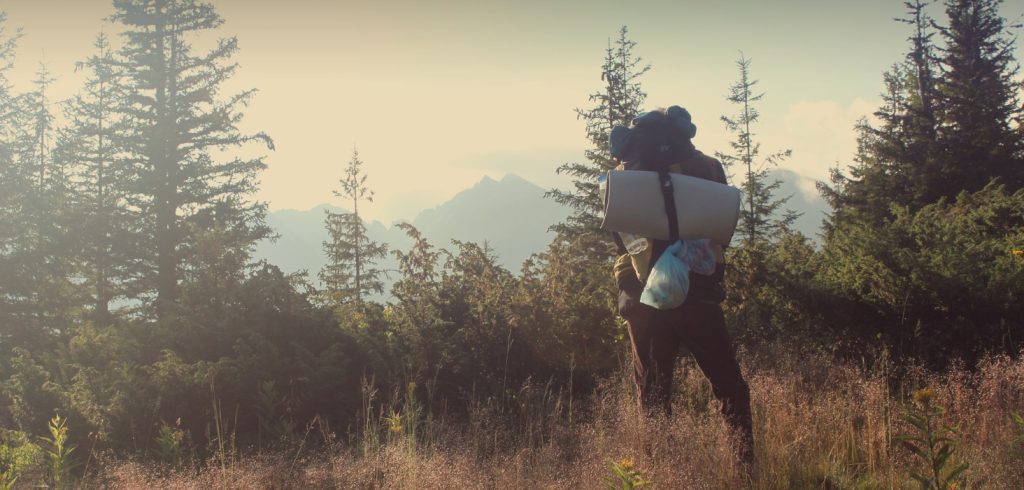
Storing Baby Formula in Mylar Bags
As a prepper, you understand the importance of being prepared for any situation. When it comes to ensuring that your baby’s nutritional needs are met

As you guys already know, we are really passionate hunters and spend most of our weekends in the bush with the backpack. Besides filling the freezer, it is amazing to be so close to nature and enjoying the quietness without smartphone, internet and other technical distractions. For me personally, being in the bush feels like finding my roots and gives me balance to my sometimes-stressful daily life. Usually we go into the bush overnight, either with a tent or using a hut. Especially for hunters it makes more sense to spend the night in the bush, because you can go deeper into the bush and have more time for a nice stalk. When spending the night in nature you can also use the early morning and late evening when game animals are more likely to be on clearings.
All bush trips should be planned thoughtfully, because you can get into dangerous situations quite easy. Therefore, it pays to think about the items in your backpack in advance. During all our little bush adventures, I gathered some valuable experience about what things are worth carrying into the bush and what is unnecessary weight in the backpack. Here you can download the full Checklist as a PDF.
Here is my personal checklist for my overnight bush backpack.
Well, that is the most obvious piece of equipment when you plan to camp in the bush. However even when you plan to spend the night in a non bookable standard hut and you know the next hut would be too far away, it might be worth to take a tent with you, just in case the hut might be occupied. Also keep in mind, that under some Covid-19 levels it is not allowed to spend the night in a hut with other people. In case you don’t want to carry a whole tent into the bush, it pays to take an emergency shelter or tube tent with you. It is lightweight and in an emergency situation it will protect you from the elements during an overnighter.
When choosing a tent, for camping in the bush, make sure you go for quality over quantity. In that particular case I mean you really don’t need a big tent, but make sure it is lightweight and doesn’t need to much space in the backpack.
I really love being in the bush, however the bush floor isn’t the most comfortable place for a good night’s sleep. Therefore, you need a good sleeping mat which protects you from the cold and softens the forest floor a little bit.
When choosing a sleeping bag make sure it is appropriate to the season. It happens quite often that the nights are way colder in the bush than they are in urban areas. During the colder season it also makes sense to take a sleeping bag liner or additional blanket with you as well, to improve the insulation capacity of your sleeping bag.
Personally, I’ll also take an inflatable pillow into the camp, because I have the feeling it enormously improves my sleep. Other people are just stuffing spare clothing or mutton cloth into a T-Shirt and use it as a pillow.
When going into the bush for a longer time you can’t really take all your water with you. It will be simply to heavy. Luckily, most places in New Zealand have a supply of water and many huts do come with a rainwater tank. But keep in mind that it is not advisable drink this water right away. You should always filter and/or boil it to make sure it is drinkable and won’t harm you. If you want to find out weather a hut has a water supply or not, check out the DOC website.
Before starting your trip, it makes also sense so check out the area for streams and other potential water sources. The DOC maps are a good source to make this sort of research. When drinking water out of a stream, make sure the water doesn’t smell or look funny. Even if it looks and smells clean you should always filter, boil or purify the water before drinking, to kill of possible microorganisms. The easiest way to do so is simply using a water filter. Water filters, like the one in our Survival Kit are usually lightweight, easy and quick to use and are compatible with PET bottles (these are the normal supermarket bought soda or water bottles). Another possibility is to boil the water for at least 5 minutes to kill off any bacteria. For that you should also have a heat resistant mug or bowl in your backpack.
Personally, I’ll go with the water filter. I think it is the easiest way and more lightweight. In addition to the water filter I’ll pack 2x 1,25 bottles of water as well for very long trips.
I recon this point is more optional. However, when carrying a tent, I also take a small tarp with me. Especially when it is raining or the ground might be wet. A tarp under the tent will give you some protection against moisture from the floor.
For most foods you will need some source of heat to prepare them properly. Three possibilities you have are a gas stove, rocket stove or a bonfire. My personal favourite is the rocket stove. Simple reason, a rocket stove runs with twigs or the small pieces of wood you can find in the bush everywhere. It is even working when the twigs are slightly damp. Therefore, it can’t really run out of fuel like a gas stove. And I know a bonfire is really romantic, it uses up a lot of wood and creates a lot of smoke.
During the summer months and in dry areas however there is a huge risk of wildfires, and fire bans will likely be in place. Make sure your cooking method complies with any rules and regulations.
Besides the heat source you will also need some sort of cooking utensils. Besides a knife, which you will want to have anyway on a trip, you will also need a heat resistant and lightweight pot/bowl/mug to boil water and warm up your food. We prefer lightweight and easy to use Titanium mugs. Then you’ll you also need cutlery like a spoon and fork. As a personal recommendation, don’t use the thin, single use cutlery you can find in any supermarket. While being very lightweight they break to easily. Believe me, eating muesli without a spoon isn’t fun. However, a great and cheap alternative are the plastic kids’ cutlery you can find in the warehouse for example. They are quite tough, long lasting and lightweight.
Even if you go with a gas stove it is important to have some sort of fire-starting equipment in case of an emergency. Therefore, you should also carry a Firestarter, firelighter, matchsticks and maybe even some fire starter or dry tinder as well. Also, a firelighter will very easily tell you what direction the wind comes from while hunting. My take is to always have at least one for any trip and at least two (or a spare set of matches) for overnighters.
Well, discussing the right knife for a hunting trip is like discussing religion or politics. Never the less, you will need some sort of good knife for skinning, gutting, cutting food and all sorts of tasks. For obvious reasons, I prefer multitools more then single knives. Therefore, my tool of choice is the leatherman or our similar Multitool. It has proven very handy in a multitude of situations. It absolutely makes sense to take a spare knife or at least a knife sharpener. Because especially when cutting though hide, most knifes tend to lose their sharpness quite quickly.
After water and shelter one of your needs will be something to eat. When packing food make sure it is something lightweight, easy to prepare and most importantly something you like. For an overnight trip I aim for 4 light meals plus snacks.
In Addition to that I would also recommend to pack in some salt and pepper. Soon there will be a whole article about bush food ideas.
You can be as careful as you like, but things can happen. Therefore, you should always carry a first aid kit with you. Besides minor cuts and bruises, which are treated easily with a band aid, you should also take more severe wounds into consideration. Therefore, the absolute must-must haves in a first air kit are:
However, for a first aid kit, more is more. Soon there will be a complete article about first aid kits.
In the bush you can lose your directions quite easily. I manly use the “NZTopo50” map on my smart phone. However, you always should have some sort of “fail proof” navigation tools with you in case your smartphone dies. Therefore, also take a compass (maybe even a small spare lightweight compass) and a paper map with you as well.
Before starting a trip make yourself familiar with the area you are going in. PLAN AHEAD! Great resources for doing so, are the DOC maps or google maps. The DOC maps will also allow you to create a paper printout of the area you want to go. But keep in mind, that those maps aren’t 100% up to date. In many regions slips or fallen trees can occur over night. So be prepared and include additional time in your planning.
A PLB or personal locator beacon is something I would recommend to everybody who likes to spend time in the bush. In case of an emergency it may safe your life. There have been many cases where hikers got lost or injured somewhere and only were found weeks later, because Search and Rescue couldn’t find them earlier. They will cost you 300+ bucks but they last for up to 10 years until the battery has to be replaced. If you don’t want to buy one right away, most I-sites or visitor centres offer PLBs for rent against a small fee.
A power bank for the smartphone isn’t necessarily a must-have. However, it isn’t too heavy and it can be quite handy to have the opportunity to charge your smartphone or torch in case the trip takes longer then expected. In order to have your own power source you can also go with our solar charger.
Especially during the winter months, the nights can be really long. Therefore, it is important to have some source of light with you. I would recommend to always have a small torch with you, even when you just go for a day hike. Keep in mind in the bush it is usually getting dark one hour earlier than in open areas.
Toilet paper or paper towels always are handy to have in your overnight hunting backpack to wipe things off, like wet feet or hands. In addition to that you can use it … well… for the loo.
As already mentioned in some regions in New Zealand small slips can occur every now and then. In that case is pays to have a small foldable shovel with you to dig your way through. Apart from that is also good to have one for burying your toilette waste when there is no loo nearby, as is recommended by DOC.
This point is more important for some people then for others. For me it is very important. However, keep it minimalistic, otherwise it will get too heavy. Therefore, I go usually go with a small piece of soap, travel toothbrush, small toothpaste, sun cream, face towel and some lotion.
As for spare clothing I would recommend spare underwear and a pair of spare socks. Because walking with wet feet is very uncomfortable.
Especially in dense bush a hat or cap is really important to protect your eyes from hanging branches. In addition to that will provide protection from the sun in summer. During winter a beanie to keep your head and ears warm might be a good idea.
The golden rule is don’t be a litter bug and take your rubbish out. Besides filling them with rubbish, they are also great to carry meat in mutton cloth or protecting pieces of equipment against the rain. Especially the Zip lock bags are a great way to protect your smartphone from water in case that river crossing goes wrong.
19. Mutton cloth
Mutton cloth is a must-have for all hunters. It is a great way to protect meat against flies and dirt. In addition to that you can use it as a towel or stuff the mutton cloth into a shirt for a makeshift pillow.
When the camp is set up and you want to go for a little stalk or explore the area you don’t want to carry your big overnight backpack with you. Some overnight backpacks have a “built-In” daypack. In case yours doesn’t, I would recommend to pack a small and lightweight backpack, like the one from our emergency kit, as well.
21. Hunting and fishing permit / hut pass / firearms licence
When you plan to go hunting or fishing or staying on a hut don’t forget your necessary permits. It makes sense to put them into a zip lock bag to protect them against moisture.
Well, especially in summer… NEVER, EVER, EVER FORGET IT. My personal recommendation is to use bug sprays with either DEET (N,N-Diethyl-meta-toluamide or diethyltoluamide) or Picaridin, both in tropical strength. I know there are a lot of natural bug sprays on the market and as much as I prefer using natural ingredients, in that case they are just useless.
Having a paper and pen at your hand is quite handy in many situations. May it be for sighting in your rifle after dropping it or leaving a message for someone.
I recon the reasons for that is obvious. However, only use what you are able and allowed to use.
Please keep in mind that every person has a different level of training, experience and knowledge. Also, everybodys priorities might be vastly different. So, this checklist is my personal checklist and might not fit for everyone. Therefore, before you go PLAN AHEAD and think about what YOU might want to add or remove. Also choose the trips and tracks according to your level of fitness and don’t overestimate yourself. Because walking with a heavy backpack is different from walking the same track with light equipment.
Optional

As a prepper, you understand the importance of being prepared for any situation. When it comes to ensuring that your baby’s nutritional needs are met

If you’re a fan of probiotic-rich foods, you’ve probably heard of kefir. This tangy, fermented drink is packed with beneficial bacteria and yeast, making it

Making your own butter at home is a rewarding and surprisingly simple process. With just a few basic ingredients and tools, you can create rich,
We are on Maternity Leave. Shop is closed till the 25th of November. All incoming orders will be shipped when we're back :) Dismiss